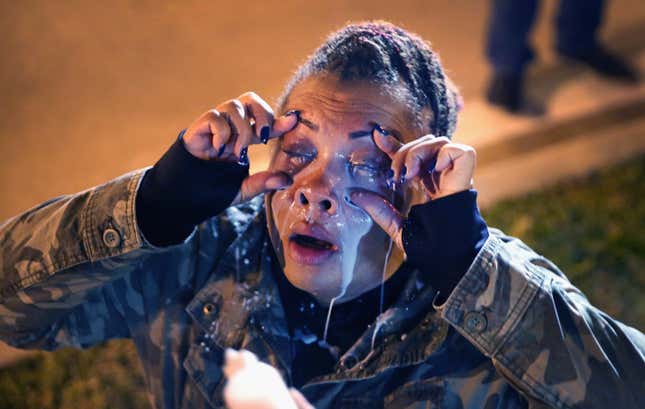
In September of 2017, the American Civil Liberties Union of Missouri sued the city of St. Louis and its police force after officers responded to peaceful demonstrations with excessive force. In what has come to be known as the “kettle,” more than 100 victims were arrested and testified that they were surrounded, beaten, pepper-sprayed and taunted as they kneeled or laid on the ground.
That November, U.S. District Judge Catherine Perry issued a preliminary injunction prohibiting police from using mace—or threatening to do so—on any protester who posed no imminent threat of violence.
“Plaintiffs’ evidence—both video and testimony—shows that officers have exercised their discretion in an arbitrary and retaliatory fashion to punish protesters for voicing criticism of police or recording police conduct,” Perry wrote at the time.
The police agreed to comply.
But now a little over a year later, the River Front Times reports that lawyers have filed a motion in U.S. District Court demanding that restrictions be lifted on their ability to declare protests “unlawful” and to resume the use of chemical agents such as pepper spray to deescalate public outcries. It notes:
On Friday, the attorneys from the St. Louis City Counselor’s Office rolled out a sprawling request for a federal judge to let cops again mace nonviolent protesters.
It is quite the document, in which the lawyers argue that everyone — including, yes, maced protesters and random people caught up in mass arrests — owe the police a “debt of gratitude” because St. Louis didn’t experience “the violence and terror of full-scale riots” in 2017 after ex-cop Jason Stockley was acquitted of murder.
According to the St. Louis Post-Dispatch, in their 39-page motion, city lawyers argue that the ACLU “inveigled the Court into improvident intrusion into police practices in the City of St. Louis” by “telescoping evidence of select portions of a connected series of mass demonstrations in the City in the fall of 2017.”
The motion also expresses concerns that Perry’s order could “weaken the city’s legal position in civil lawsuits filed by protesters and others over police activity,” while citing civil lawsuits as “remedies” for alleged misconduct in place of “federal judge intervention into city affairs.”
While refusing to acknowledge police misbehavior, lawyers also presented a list of every protest since 2012 and declared that the police use of force has been “rare.”
In response to the motion, Tony Rothert, legal director of ACLU of Missouri offered the following: “We’ll be responding, but we see the case differently, of course.” He noted that when nearing the end of an exchange of evidence, that a motion of this nature is common.
The motion makes for a pretty interesting read. And for those interested, it’s available here.
We’ll keep you updated as this story develops.

